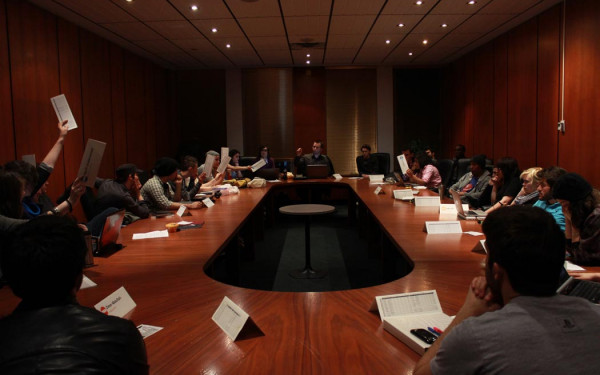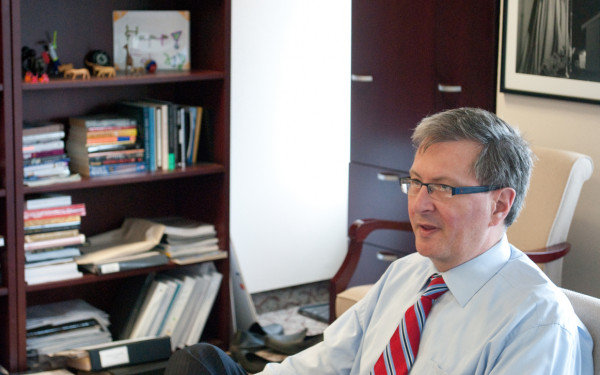Sasha Dyck Seeking Election to City Council in Park Ex
30-Year-Old Concerned About New UdeM Campus and Housing
Two years ago, Sasha Dyck got together with a group of neighbours to create Café l’Artère, a solidarity co-operative in Montreal’s Park Extension district that would offer the community healthy and affordable meals, as well as a much-needed space for meetings and the arts.
It was fitting, then, that Dyck chose the cozy coffee shop as the setting for his official campaign launch on Sept. 14. The 30-year-old father-to-be is seeking election to Montreal’s city council in Park Extension, running under the banner of political party Projet Montréal.
When he took to the stage at the campaign launch, Dyck told the crowd that Park Extension is “the poorest neighbourhood in Montreal financially.” However, he said the district is statistically among the richest in Montreal “when you start looking at wealth in terms of the connections that people have and the social solidarity that ties us together.”
“We are very rich,” Dyck said. “But it’s not in our pockets. It’s in our hearts. And it’s this wealth that we must count on to face all the challenges of this district.”
Dyck was born in Mexico City to a Canadian mother and an American father—“a truly NAFTA baby,” he quipped. He grew up in Montreal’s Mile End district and attended school in French at FACE before moving to Indiana for college.
In 2008, he came back to Montreal to pursue graduate studies in nursing at McGill—where, The Link reported, he and other demonstrators were pepper-sprayed by police during a student protest in 2011.
Dyck explained to his audience that, upon his return to Montreal, he was disappointed to find that rents in his old stomping ground, the Mile End, had become unaffordable. He settled instead in nearby Park Extension, and thus began what he described as a five-year love affair with the neighbourhood, where he has been involved in a variety of community organizations since then.
On Université de Montréal’s New Campus
If he is elected city councillor in Park Extension, Dyck will have a seat on Montreal’s city council, as well as a seat on the local council of the Villeray–Saint-Michel–Parc-Extension borough.
In an interview with The Link, Dyck said that an important issue in the Park Extension district is the Université de Montréal’s planned campus on the border with Outremont, one of the city’s wealthiest neighbourhoods.
The Université de Montréal, one of Canada’s largest universities, is looking to expand but is short on space at its current location on the side of Mount Royal. This led to the $18-million purchase of the old rail yards between Park Extension and Outremont from Canadian Pacific in 2006.
The railway line that currently runs through the south of the site is expected to be moved north in 2015. Once decontamination of the land is complete, the city will install the necessary infrastructure before the university begins construction of the new state-of-the-art science, education and library pavilions.
The 300,000-square metre campus is projected to cost a total of $1.6 billion, with significant investments from the province and from the city. It is expected to be finished in 2018 and bring 10,000 students and employees into the area.
“[The new campus] is a challenge but also a huge opportunity, if we do it correctly,” Dyck explained. “We’ve been trying to get anybody to listen to why this is very important to Park Ex.”
He said the new university campus could cause rents in the area to increase, since a group of students pitching in for an apartment together can often pay more than a young family. On the other hand, Dyck also sees benefits in having a “huge world-class neighbour.”
Dyck is a co-founder of the Marconi-Beaumont Coalition, which includes citizens and citizen groups from the Park Extension, La Petite-Patrie and Villeray districts. In response to plans for the new Université de Montréal campus, the Coalition’s website “demands a social development that takes into account housing needs, issues of peoples’ mobility and health, impacts on the local economy and the fight against poverty.”
More specifically, the Coalition requests the development of social housing, the implementation of measures to reduce traffic and promote active transport, the installation of parks and vegetation, the preservation of local jobs, and a transparent public consultation process.
On Affordable Housing
Another issue in the city and the borough, according to Dyck, is the migration of Montrealers to the outer suburbs. Richard Bergeron, leader of Projet Montréal, told the Montreal Gazette that his greatest priority if elected will be to keep middle-class families in the city. He said the void left behind by the exodus to suburbia is being filled by immigrants with lower-than-average incomes who are making the city “poorer and poorer.”
When asked about his comments by The Link, Bergeron stood by them. “It’s a fact,” he insisted. “Then, when [immigrants] integrate and become middle-class, they move out to the suburbs.”
But is it possible for the city to appeal to middle-class families while at the same time offering quality affordable housing for disadvantaged communities, including new immigrants? Yes, says Dyck, whose district serves as “a landing pad” for many recent arrivals and has “a long, proud immigrant and working-class tradition.”
According to Dyck, the key is to employ a co-operative model similar to that used at Café l’Artère. He said that housing co-ops “have a mix, a diverse group of people, people paying different rates.”
“They often pay what they can afford to pay and it’s up to the co-operative, to the board which represents everybody who lives there, to decide how much they pay,” Dyck said. “I have friends living in a 1980s co-op and they’re still paying 1980s prices because they’re not paying the middleman, the landlord.”
Dyck said current social housing, such as the habitations à loyer modiques model popularized in the 1960s and 1970s, “tends to create ghettos where everybody is of a certain socioeconomic status.”
“And more importantly, they’re very hard to maintain [because of] the large inflexible bureaucratic institutions at the city or provincial level,” Dyck went on. “You need to have self-interested people act as their own landlords.”
With co-operative housing, residents of a unit can manage the quality of their own living conditions while keeping their rents low through their participation on the board. Dyck called this “a very elegant solution.”
Dyck said the municipal government, along with taking measures to slow down the rampant speculation that is currently driving up rents, must support organizations applying to the provincial government for social-housing funding to create co-ops.
“[The provincial government] writes cheques for about 2,000 units through their program in the province every year and Montreal gets 800 or 900 of them,” he said. “But you have to make a proposal and you have to have the backing of the borough. So the borough can do a lot to actually help those projects come to fruition.
“To get the funding,” Dyck added, “a certain percentage of the units have to be for people under the poverty line.”
In Montreal’s most economically disadvantaged neighbourhood, there is certainly no shortage of people in that difficult position.
Elections will take place in municipalities throughout Quebec on Nov. 3.

_800_1000_90.jpg)


_600_375_90_s_c1.jpg)
_600_375_90_s_c1.jpg)

